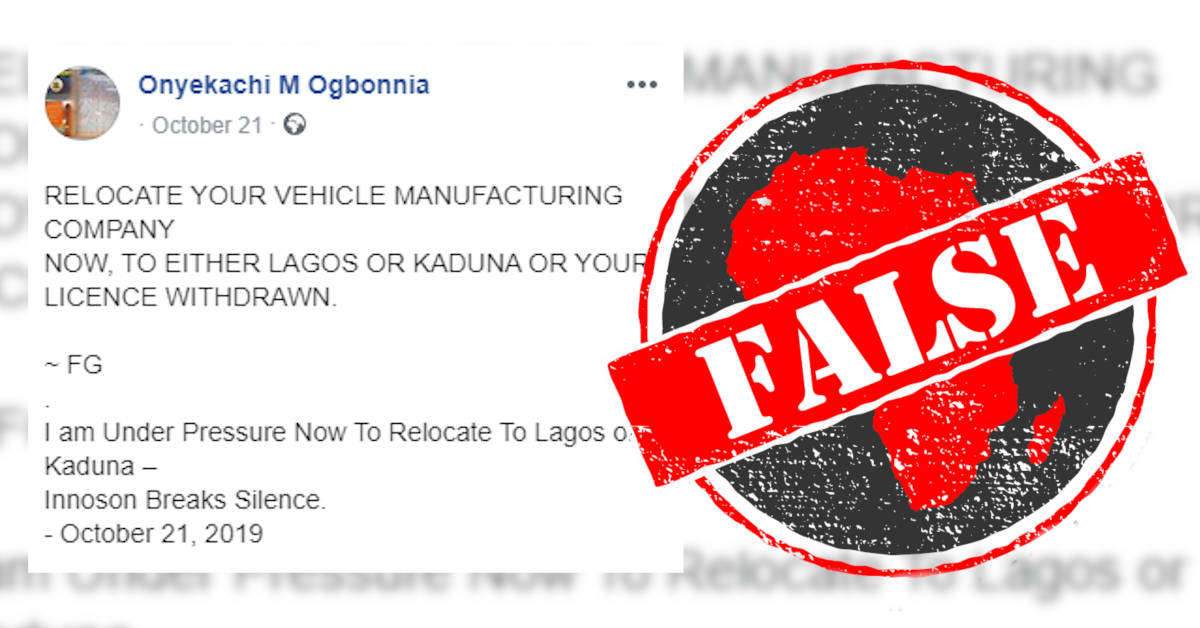A message circulating on social media among Nigerians makes claims about the country’s first local automaker, Innoson Vehicles Manufacturing. It says the Nigerian government has ordered Innoson to move from Nnewi in the south east of the country, to either Lagos in the south west or Kaduna in the north west.
Innoson has had a lengthy legal battle with Guaranty Trust Bank. The message claims that this is a “smokescreen”, and that Innoson is being targeted by the Nigerian government, because of its animosity towards Igbo people in the south east of Nigeria, and it being against Biafran independence.
“Many of you would not know why Innoson is persecuted under the smokescreen of GTB nonsense. He was asked to relocate his automobile production plant to either Kaduna or Lagos, he refused and insists to adhere to [Chukwuemeka] Ojukwu’s counsel to Nnewi sons not to move their investments outside Nnewi,” the message says.
Ojukwu, who was a regional military governor, led the secession of his south-eastern region to form the Republic of Biafra in 1967, which resulted in a three-year civil war. He was a native of Nnewi in Anambra state and died in 2011. Innocent Chukwuma, the founder of Innoson, is also from Nnewi.
The message further claims that the Nigerian airforce attempted to lure Innoson to Kaduna with a contract for “refurbishing their ageing aircraft” but that Chukwuma refused.

Innoson made a statement to the media and on its official Facebook page on 22 October 2019 to debunk the claims.
The company asked the public to disregard the “fallacious publication in its entirety as there is no element of truth therein”.
It also said: “... knowing fully well that this is the handwork of mischief makers, but in a nation where silence may be seen as admission of the truth, we have been constrained to come out to officially ask the public to disregard it and set the record straight.” – Allwell Okpi
Innoson has had a lengthy legal battle with Guaranty Trust Bank. The message claims that this is a “smokescreen”, and that Innoson is being targeted by the Nigerian government, because of its animosity towards Igbo people in the south east of Nigeria, and it being against Biafran independence.
“Many of you would not know why Innoson is persecuted under the smokescreen of GTB nonsense. He was asked to relocate his automobile production plant to either Kaduna or Lagos, he refused and insists to adhere to [Chukwuemeka] Ojukwu’s counsel to Nnewi sons not to move their investments outside Nnewi,” the message says.
Ojukwu, who was a regional military governor, led the secession of his south-eastern region to form the Republic of Biafra in 1967, which resulted in a three-year civil war. He was a native of Nnewi in Anambra state and died in 2011. Innocent Chukwuma, the founder of Innoson, is also from Nnewi.
The message further claims that the Nigerian airforce attempted to lure Innoson to Kaduna with a contract for “refurbishing their ageing aircraft” but that Chukwuma refused.

Innoson debunks claims
Innoson made a statement to the media and on its official Facebook page on 22 October 2019 to debunk the claims.
The company asked the public to disregard the “fallacious publication in its entirety as there is no element of truth therein”.
It also said: “... knowing fully well that this is the handwork of mischief makers, but in a nation where silence may be seen as admission of the truth, we have been constrained to come out to officially ask the public to disregard it and set the record straight.” – Allwell Okpi
Republish our content for free
For publishers: what to do if your post is rated false
A fact-checker has rated your Facebook or Instagram post as “false”, “altered”, “partly false” or “missing context”. This could have serious consequences. What do you do?
Click on our guide for the steps you should follow.
Publishers guideAfrica Check teams up with Facebook
Africa Check is a partner in Meta's third-party fact-checking programme to help stop the spread of false information on social media.
The content we rate as “false” will be downgraded on Facebook and Instagram. This means fewer people will see it.
You can also help identify false information on Facebook. This guide explains how.





Add new comment